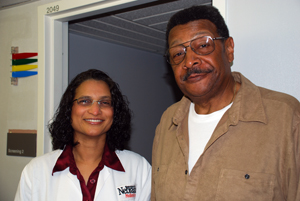 |
UNMC ophthalmologist Sushma Rai, M.D., with glaucoma patient, Bob Rose. Today is World Glaucoma Day and Dr. Rai, Rose and others urge people to get early screening for the condition, which silently robs sufferers of their sight. |
She sees the consequences of people waiting too long to get screened. Her message is glaucoma damage to sight is irreversible, so the earlier glaucoma is caught and treated, the more sight can be preserved.
As a result of the increasing and aging population, glaucoma numbers are on the rise worldwide, resulting in more people going blind. It is predicted that by the year 2020, 80 million people worldwide will have glaucoma, and 11 million of them will be blind in both eyes.
Glaucoma, known as the “silent blinding disease,” is the second leading cause of blindness in developed countries.
Most glaucoma patients do not know they have the condition because symptoms only show late in the disease progress when a significant part of the vision has been irretrievably lost.
“This is all about getting the word to the people to get an eye exam,” said Dr. Rai, UNMC assistant professor of ophthalmology who practices at the UNMC Physicians Eye Specialties on campus. “It is really frustrating to see patients with advanced glaucoma knowing if they had come to me sooner, we could have slowed down the progression.
“There’s less chance of going blind if you’re diagnosed early so you can get on medication or have laser procedure or surgery, all of which control eye pressure.”
She said vision loss associated from glaucoma doesn’t necessarily mean losing all vision.
“It affects peripheral vision so you can have difficulty driving, difficulty walking — bumping into things … it affects your quality of life — many are seniors who live by themselves,” Dr. Rai said. “It also is associated with depression because it affects quality of life. It’s not just a physical limitation.”
World Glaucoma Day, which is today (March 12), is a joint initiative of the World Glaucoma Association and the World Glaucoma Patient Association.
The general recommendation is to be screened for glaucoma after age 50. But if you have a risk factor such as family history, or are of black or Latino descent, recommendations are to get screened every two to four years starting in your 40s. In addition, if you’re on certain medications that can cause high eye pressure, such as steroids, or have suffered injuries to the eyes, screening is recommended.
During screening, physicians check eye pressure and dilate the pupils to examine the optic nerve. There usually are no symptoms of glaucoma until the disease is advanced. That’s why it’s crucial to get screened regularly.
Bob Rose found out in a roundabout way that he had glaucoma.
While he was a pilot in the U.S. Air Force, he wore glasses but had very little change in vision (prescription). When he retired, he started golfing. He had always worn glasses but found when he’d perspire on the golf course, he would sweat and his glasses would slide down his nose. It was distracting.
An eye doctor suggested he might want to try contacts but he ultimately decided he didn’t like them. During the process, he discovered he had the beginning of cataracts and ultimately, he had cataract surgery. Things were fine for a while then he got a slight infection and was on steroids for a while.
|
“I started taking more drops to keep under control,” Rose said. “It got to the point that I was using a lot of drops, which caused my eyes to get irritated.”
He and his eye doctor decided it was time for the next step — laser treatment. He had three laser treatments on his right eye and one on his left. Since that wasn’t too effective, he ended up having surgery on both eyes.
“The interesting thing about glaucoma is you don’t know you have it,” Rose said. “There’s no pain or discomfort involved. The first indicator when something is wrong is when you’re losing vision.”
He said he has not had to curtail his activities yet as a result of his vision problems, but he is concerned about being able to travel and go snorkeling and bird watching.
Health insurance may pay for some screenings. Check with your health insurance provider.
To make an appointment to get a glaucoma screening or other visual services, contact UNMC Physicians Eye Specialties at 559-2020.
Beginning April 27, appointments for glaucoma screenings and other vision services also can be made at the Village Point Medical Center southwest of the shopping center at 110 N. 175th St. Call 596-4600 for an appointment.